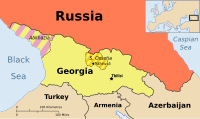| Milk War | |||
|---|---|---|---|
 | |||
| Date | 6–17 June 2009 | ||
| Location | |||
| Resulted in | Russia lifts Belarusian dairy ban | ||
| Parties | |||
| Lead figures | |||
| Russo-Georgian War |
|---|
 |
| Main topics |
| Related topics |
|
|
The Milk War was a trade conflict between Russia and Belarus in June 2009. Russia and Belarus have close relations and the conflict stemmed from Russia allegedly attempting to pay Belarus US$500 million to recognize the independence of Abkhazia and South Ossetia. Russia also expressed its interest in privatizing the Belarusian milk industry. Belarus responded by seeking negotiations with the European Union on certifying Belarusian milk according to EU regulations. Russia then banned the import of dairy products from Belarus, citing alleged health concerns. The trade conflict ended on June 17, 2009, when Russia announced that it would lift the ban.
Later in 2009, Belarusian president Alexander Lukashenko expressed regret for not supporting Russia in recognizing Abkhazia and South Ossetia. The Belarusian House of Representatives sent a fact-finding mission to the disputed regions to study whether or not Belarus should provide diplomatic recognition. Georgia protested the mission and urged Belarus to maintain non-recognition.
Russia threatened another Milk War in 2013, and has reimposed temporary bans on Belarusian dairy products since. Bans were in place in June 2017, and from February 2018 until being mostly lifted in May 2019. Russian concerns include international sanctions that supposedly allow Belarus to take advantage of the market by producing products of inferior quality. In turn, Belarusian producers claim that Russia has imposed harsh obstacles on them. Belarus has objected to these trade wars, stating that they contribute to the country's international isolation.